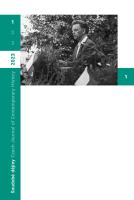Zemřel Karel Kaplan
Karel Kaplan Has Died
August 28, 1928 (Horní Jelení) – March 12, 2023 (Prague)
Author(s): Oldřich TůmaSubject(s): History, Post-War period (1950 - 1989), Transformation Period (1990 - 2010), History of Communism, Obituary
Published by: AV ČR - Akademie věd České republiky - Ústav pro soudobé dějiny
Keywords: Karel Kaplan;Czechoslovakia;Czech historiography;Czech Republic;communism;contemporary history
Summary/Abstract: Oldřich Tůma in his obituary recalls the historian Karel Kaplan (1928–2023) as one of the founders, a central figure and a true father of the field of Czechoslovak and Czech contemporary history, not only locally, but also internationally. His life trajectory was symptomatic of a whole generation of Czech historians: he was not only a historian of post-war Czechoslovakia for the period from 1945 to 1968, but in many ways also an actor and co-creator of the era. Soon after the war, he joined the Communist Party of Czechoslovakia (Komunistická strana Československa, KSČ) and for the following sixteen years worked in various positions in its apparatus. At the same time, he became professionally involved in recent Czechoslovak history. In the second half of the 1960s, he served as deputy director of the Historical Institute of the Czechoslovak Academy of Sciences, while, in a parallel way, becoming involved in the reform movement as an expert on influential social science teams and as a member of commissions established to rehabilitate victims of the illegal political trials of the 1950s. After the defeat of the Prague Spring, he was expelled from the party, deprived of the ability to practice his profession and imprisoned for several months. In 1976, he emigrated to the Federal Republic of Germany. In exile, he published a number of works analysing the functioning of the communist regime in Czechoslovakia. He drew on a large and unique collection of documents from the archives of the Central Committee of the Communist Party of Czechoslovakia, copies of which he made at home and, with the help of friends, exported abroad. Since the early 1990s he was involved in the activities of the newly established Institute of Contemporary History of the Czechoslovak (later Czech) Academy of Sciences in Prague and wrote numerous other works on the establishment of the communist regime in Czechoslovakia, the mechanisms of staged political trials, social history after 1948 and other topics that, taken together, form the pillars of today’s historiography of communist Czechoslovakia. Karel Kaplan is perhaps not only the most prolific but also the most translated Czech historian of contemporary history, whose works have been published in many languages. The author emphasizes that Kaplan’s working method was indeed strongly empirical, which some scholars are critical of, but his findings were based on a deeply thought-out and consistent interpretative concept of Czechoslovak post-war history, and his studies provided much more than a mere reproduction of the archival material.
Journal: Soudobé Dějiny
- Issue Year: XXX/2023
- Issue No: 1
- Page Range: 306-310
- Page Count: 5
- Language: Czech

